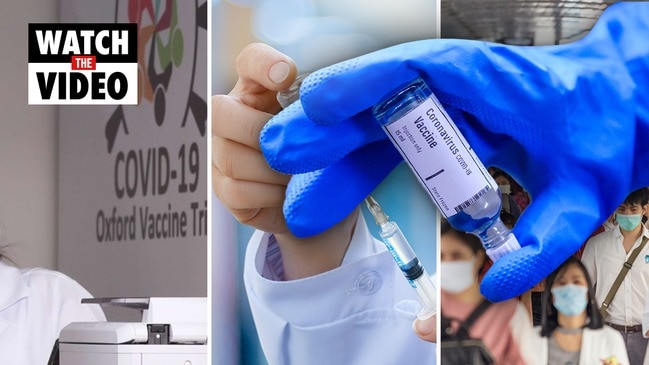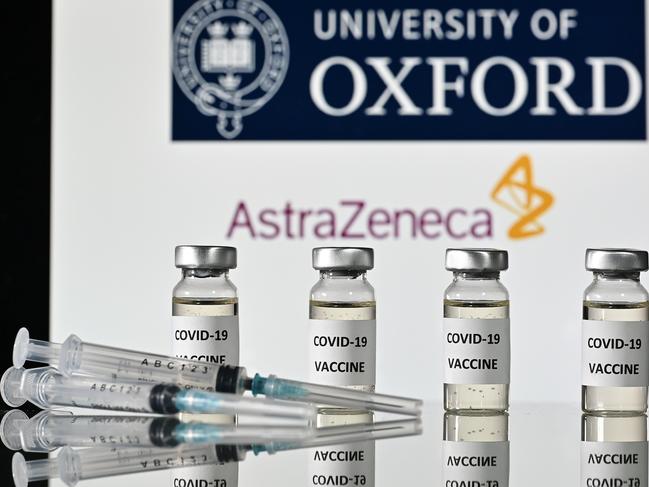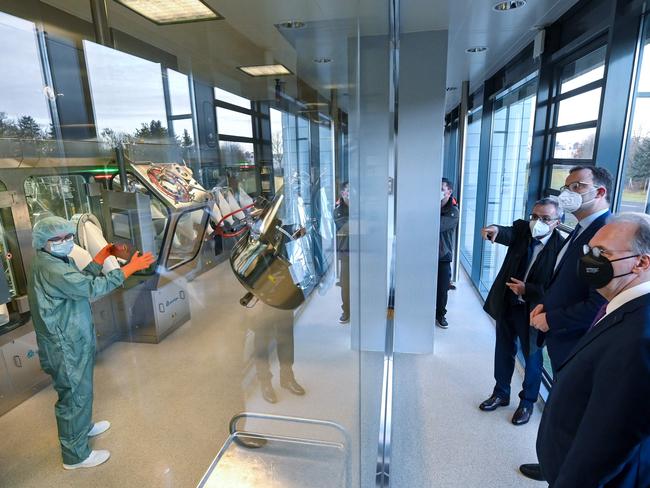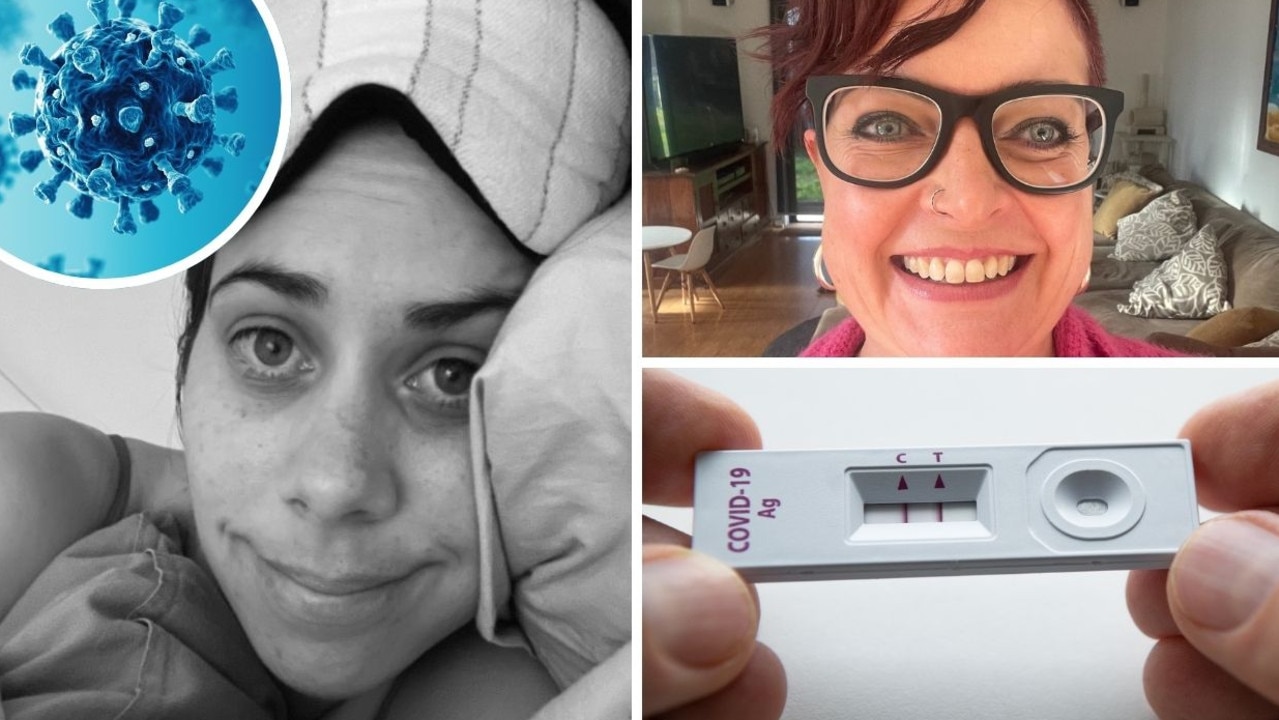Coronavirus: Burning question about Oxford COVID-19 vaccine
AstraZenca’s Oxford vaccine is set to arrive in Australia early next year after proving 90 per cent effective, but scientists are still baffled by one major thing.

Coronavirus
Don't miss out on the headlines from Coronavirus. Followed categories will be added to My News.
It’s the mystery that could be the key to a faster rollout of a COVID-19 vaccine — why did people respond better when given only a half dose of AstraZeneca’s vaccine?
While scientists are still trying to figure out why it happens the good news is it means less of the vaccine will be needed to dose each person so more people are likely to get it more quickly.
AstraZeneca’s COVID-19 vaccine was only 62 per cent effective in people given two full doses delivered a month apart the company revealed overnight.
But among those who received just a half dose in their first jab and then a full dose in their second jab the vaccine was 90 per cent effective.
Scientists are speculating there could be a number of possible reasons the half dose regime is more effective.
One is that there was only a small number of people involved in the half dose trial the trial —2741 participants compared to 8,895 in the full dose arm of the trial.
The trial might not have been big enough to gauge the difference between the two regimens, and the differences will vanish once more cases of COVID-19 are detected, Luk Vandenberghe, a virologist at the Massachusetts Eye and Ear Institute and Harvard Medical School in Boston has suggested.
Another theory is that it could be related to the de-activated chimpanzee virus the Oxford/AstraZeneca vaccine uses to prompt our immune system to respond to the virus that causes COVID-19.
It’s possible that the chimpanzee virus may have blunted the immune systems reaction to the first dose of the vaccine said Katie Ewer, an immunologist at Oxford’s Jenner Institute which invented the vaccine.
Other explanations include that lower doses of vaccine are better at stimulating immune cells called T cells that support the production of antibodies, she said.
Or, the half dose could lead more quickly to the establishment of ‘memory’ immune cells that are triggered by a second-dose boost. Waiting longer between the two doses could achieve the same effect Hildegund Ertl, a viral immunologist at the Wistar Institute in Philadelphia told Nature briefing.
OXFORD VACCINE WILL COST $4 A DOSE
Australia’s biggest vaccine bet will be applied for approval within weeks — if not sooner — after results showed that Oxford University’s candidate produced up to 90 per cent effectiveness.
The vaccines were now on track to be rolled out in March, Health Minister Greg Hunt said.
“I am delighted with the latest results from the Oxford AstraZeneca vaccine,” he told News Corp Australia on Monday night.
“I have this evening been briefed by the Australian CEO who has confirmed that AstraZeneca is now looking to proceed with Australian regulatory approval in the coming weeks — if not sooner.
“Subject to approval, this means that Australians are very much on track for first vaccines in March.”
AstraZeneca, the company bankrolling the vaccine, will now “immediately” prepare paperwork to get the jab signed off for approval.
Australia has ordered 33.8 million doses, most of which will be made by CSL in its Melbourne factory.
The results were based on trials from the UK and Brazil, with studies showing that a half dose, followed by a full dose a month later, was able to produce up to 90 per cent effectiveness.
AstraZeneca said in a statement that it would seek emergency use listing from the World Health Organisation.

Professor Andrew Pollard, chief investigator of the Oxford Vaccine Trial, said: “These findings show that we have an effective vaccine that will save many lives.
“Excitingly, we’ve found that one of our dosing regimens may be around 90% effective and if this dosing regime is used, more people could be vaccinated with planned vaccine supply.
“Today’s announcement is only possible thanks to the many volunteers in our trial, and the hard working and talented team of researchers based around the world.”
There have already been remarkable results in trials of the Pfizer and Moderna vaccines which showed almost 95 per cent effectiveness.
The Oxford results were significant because it is a cheaper vaccine and could be rolled out more widely than the mRNA based jabs.
The half dose plus full dose regime would also mean that it could be used on more people than if two full doses were needed, as originally thought.
Pascal Soriot, Chief Executive Officer, of AstraZeneca said that the results were an important milestone.
“This vaccine’s efficacy and safety confirm that it will be highly effective against COVID-19 and will have an immediate impact on this public health emergency,” he said.
“Furthermore, the vaccine’s simple supply chain and our no-profit pledge and commitment to broad, equitable and timely access means it will be affordable and globally available, supplying hundreds of millions of doses on approval.”
The head of AstraZeneca in France, Olivier Nataf, said that the vaccine will be made available at cost price. This is a different strategy from some of their competitors. Asked by AFP what the thinking was behind the strategy, Mr Nataf said “it’s more than a strategy, it’s a commitment.”
“The price is around 2.50 euros ($A4) per dose. This is the main subject of our agreement with Oxford, in order to be able to provide this vaccine to the widest possible population, under the most equitable conditions of access possible,” he said.
“We are committed to these three billion doses at cost price for 2021. We must not forget that this is a race against the virus rather than a race for the vaccine between competitors.
As an industrialist, I hear this a lot, but in fact there are a lot of collaborations in this race against the virus: Pfizer has partnered with BioNtech, Sanofi with GSK, AstraZeneca with the University of Oxford.”
US, UK, EU COULD START JABS IN DECEMBER
The US, UK and Germany have announced plans to begin vaccinations in their countries in December, while Spain said it would roll out the vaccine to its citizens in January.
Britain could give regulatory approval to Pfizer-BioNTech’s vaccine as early as this week, even before the US authorises it after final trial results showed a 95 per cent success rate and no serious side effects.
Last week, Britain requested its medical regulator, the MHRA, to assess the suitability of the Pfizer-BioNTech vaccine.
Moderna last week released preliminary data for its vaccine showing 94.5 per cent effectiveness.
In the US, the head of the US vaccine program, Moncef Slaoui, said the first Americans to receive a vaccine could get it as soon as 11 December, according to CNN.
“Our plan is to be able to ship vaccines to the immunisation sites within 24 hours from the approval, so I expect maybe on day two after approval on the 11th or the 12th of December,” he said in an interview.

Germany could also start administering the COVID-19 vaccine as soon as next month, health minister Jens Spahn was quoted as saying on Sunday.
He said Spain and Germany were the first EU countries to have a complete vaccination rollout plan in place.
Mr Spahn said he had asked Germany’s federal states to have their vaccination centres ready by mid-December and that this was on target.
Spain will begin a comprehensive vaccination program in January and expects to inoculate a majority of the population within three months, the prime minister, Pedro Sanchez, said on Sunday.
Meanwhile, nearly 2 billion doses of vaccines will be delivered to developing countries next year in a “mammoth operation”, the UN children’s agency Unicef said on Monday.
MORE NEWS
Vaccination will be compulsory for Qantas passengers


